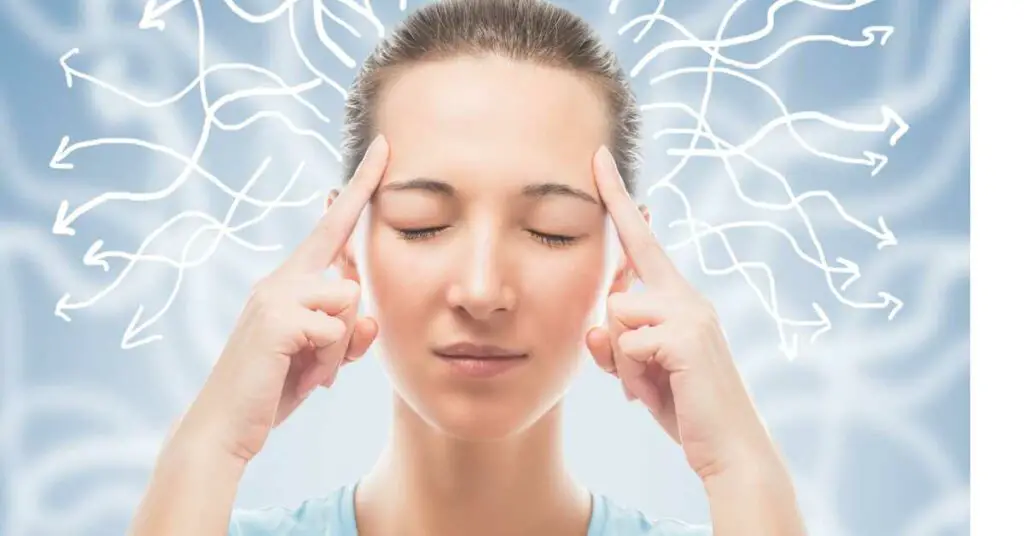Hey there, fellow seekers of focus and concentration! Let’s talk about something we all struggle with from time to time: staying focused in a world full of distractions.
Whether it’s the constant buzzing of our phones, the never-ending flow of notifications, or the endless stream of thoughts running through our minds, it can be tough to stay on track and get things done.
That’s where meditation comes in. Yes, you heard me right, meditation! It might sound like only hippies and monks do, but it’s a powerful tool for improving your concentration and productivity. And no, you don’t have to sit cross-legged on a mountaintop for hours to reap the benefits.
meditation can improve concentration. Meditation is a mindfulness practice that helps train the mind to focus on the present moment and reduce distractions. By regularly practicing meditation, one can enhance their ability to concentrate and maintain focus for longer periods
But before we dive into how meditation can help improve your focus and attention, let’s take a closer look at what concentration really means, why it’s so important, and how our modern lifestyle affects it.
And don’t worry, I promise to keep it interesting and even sprinkle in a little humor along the way.
So, what is concentration anyway? Well, you might think of it as the ability to focus your attention on a particular task or activity, without being distracted by external or internal stimuli.
It’s like putting blinders on a horse, except you’re the horse, and the blinders are your laser-like focus.
Now, why is concentration so important? For starters, it’s essential for productivity. Whether you’re a student, an entrepreneur, or a CEO, you need to be able to focus on the task at hand to get things done efficiently and effectively.
So, are you ready to boost your concentration and productivity with meditation? Stick around, and we’ll show you how it’s done.

What is Concentration?
Concentration is the ability to focus your attention on a particular task or object while ignoring distractions. It is the mental skill that allows you to stay on track and get things done. There are two types of concentration: passive and active.
Passive concentration is the ability to sustain your attention on something without actively engaging with it. For example, reading a book or watching a movie requires passive concentration.
Active concentration, on the other hand, is the ability to sustain your attention on something while actively engaging with it. For example, solving a math problem or writing an essay requires active concentration.
The importance of concentration cannot be overstated. It is essential for productivity, learning, and mental well-being. Without concentration, it is difficult to accomplish anything meaningful, and you may feel scattered and unproductive.
Lack of concentration can have negative effects on your daily life. You may find it hard to focus on your work or studies, and your mind may wander off to other things. This can lead to frustration, procrastination, and decreased productivity.
In contrast, improving your concentration can have a significant positive impact on your life. It can help you achieve your goals, reduce stress, and improve your overall mental well-being. By enhancing your concentration skills, you can become more efficient, productive, and successful in your endeavors.
The Science Behind Concentration and Meditation
Have you ever wondered what happens in your brain when you concentrate on a task? Well, it turns out that there are specific areas in your brain responsible for concentration, such as the prefrontal cortex and the parietal cortex. These areas work together to filter out distractions and maintain focus on the task at hand.
Meditation, on the other hand, has been shown to have a profound impact on the brain. Studies have found that regular meditation practice can increase the thickness of the prefrontal cortex, the area responsible for executive function, including attention, working memory, and decision-making.
Moreover, meditation has been shown to enhance the connectivity between different regions of the brain, including the prefrontal cortex and the parietal cortex, which are crucial for concentration.
By improving the communication between these regions, meditation can help increase your ability to focus and filter out distractions.
Mindfulness, a common form of meditation, has also been shown to be particularly effective in improving concentration. Mindfulness is the practice of being fully present and engaged in the current moment, without judgment or distraction.
By training your mind to be present at the moment, you can improve your ability to concentrate on the task at hand.
In addition to improving concentration, regular meditation practice has also been shown to have a range of other benefits, including reducing stress, improving sleep quality, and boosting overall mental well-being.
So, if you want to improve your concentration, meditation is a great place to start. By training your brain to focus and filter out distractions, you can enhance your productivity, achieve your goals, and lead a more fulfilling life.
Can Meditation Enhance Focus?
Have you ever found yourself struggling to focus on a task? Perhaps you’re easily distracted or find your mind wandering. If so, you’re not alone. Many people struggle with maintaining focus, and this can have a negative impact on productivity and overall well-being.
But what if there was a way to enhance your focus and improve your ability to concentrate? That’s where meditation comes in. Meditation has been shown to have a positive effect on focus and attention, making it a valuable tool for those who struggle with maintaining concentration.
Research has found that regular meditation practice can lead to improvements in cognitive function, including attention and focus.
In fact, a study published in the Journal of Cognitive Enhancement found that just four days of mindfulness meditation practice led to improvements in sustained attention and working memory.
The benefits of meditation for focus and attention aren’t just limited to those without concentration issues. Meditation has also been shown to be effective in improving focus for individuals with ADHD and other concentration disorders.
One reason meditation may be effective in enhancing focus is that it helps to quiet the mind and reduce distractions. By learning to focus on the present moment and let go of distracting thoughts, individuals can improve their ability to concentrate on tasks and stay on track.
So, whether you’re looking to enhance your focus and productivity at work or improve your ability to concentrate on daily tasks, meditation is a powerful tool to consider.

How Can We Use Meditation to Enhance Concentration?
Now that we know how meditation can improve concentration, let’s talk about how we can incorporate it into our daily routine.
- Start small and be consistent:
It’s important to start with a few minutes of meditation per day and gradually increase the time as you become more comfortable with the practice. It’s better to meditate for a few minutes consistently every day than to meditate for an hour once a week.
- Find a quiet and comfortable place:
It’s essential to find a quiet and comfortable place where you can meditate without any distractions. This can be a corner of your room or a quiet park nearby.
- Choose a meditation technique:
There are different types of meditation techniques that you can choose from to enhance your concentration. For example, mindfulness meditation, body scan meditation, and loving-kindness meditation are all great options.
- Focus on your breath:
One of the most popular meditation techniques is to focus on your breath. This involves simply sitting quietly and focusing on your breath as it goes in and out. When your mind starts to wander, gently bring it back to your breath.
- Set an intention:
Before you start meditating, set an intention for what you want to achieve. This could be to improve your concentration, reduce stress, or simply relax.
- Use guided meditations:
If you’re new to meditation, using guided meditation can be helpful. There are many apps and websites that offer free guided meditations, which can help you stay focused and calm.
By incorporating meditation into your daily routine, you can enhance your concentration and improve your overall mental well-being. So why not give it a try and see how it can benefit you?
Step-By-Step Meditation Guide to Improving Concentration
Are you ready to try meditation to improve your concentration? Great! Here’s a step-by-step guide to getting you started:
- Find a quiet and comfortable space
Choose a quiet and comfortable space where you can sit or lie down without being disturbed. You may want to sit on a cushion or a chair with your back straight, but not tense. Alternatively, you can lie down on a mat or a bed if you prefer.
- Set a timer
Set a timer for 5 to 10 minutes, or longer if you have more experience with meditation. This will help you stay focused and not worry about how much time has passed.
- Focus on your breath
Close your eyes and take a few deep breaths to relax your body and mind. Then, bring your attention to your breath. Notice the sensation of the breath as it enters and leaves your nostrils. You can also focus on the rise and fall of your chest or abdomen as you breathe.
- Observe your thoughts
As you focus on your breath, you may notice thoughts popping up in your mind. Don’t try to suppress or ignore them. Instead, observe them without judgment and let them pass by like clouds in the sky. Then, gently bring your attention back to your breath.
- Repeat
Continue to focus on your breath and observe your thoughts for the duration of the meditation. Don’t worry if your mind wanders, it’s normal. Just keep bringing your attention back to your breath.
- End your meditation
When your timer goes off, take a few deep breaths and slowly open your eyes. Take a moment to notice how you feel. You may feel more relaxed and focused.
- Practice regularly
Practice this meditation daily, preferably at the same time and in the same place. With regular practice, you’ll find it easier to concentrate and focus your attention.
Remember, meditation is a skill that takes time to develop. Be patient and kind to yourself. Don’t expect instant results, but with regular practice, you’ll notice improvements in your concentration and overall well-being.

Different Types of Meditation Techniques That Can Improve Concentration
Meditation is a versatile practice that offers several techniques for improving concentration. Each technique focuses on a different aspect of concentration, such as breath control, visualization, or mindfulness.
Here are some examples of meditation techniques that can help improve concentration:
- Mindfulness meditation
This technique involves paying attention to the present moment without judgment. Mindfulness meditation can help improve concentration by training the mind to focus on the present rather than getting lost in distractions.
- Transcendental Meditation
This technique involves the use of a mantra or sound to help the mind settle into a state of deep relaxation. Transcendental Meditation can help improve concentration by calming the mind and reducing stress.
- Breath Control Techniques
These techniques focus on controlling the breath to regulate the body and mind. Breath control techniques, such as pranayama in yoga, can help improve concentration by increasing oxygen flow to the brain and reducing stress.
- Visualization techniques
This technique involves creating a mental image or scene to focus the mind. Visualization techniques can help improve concentration by providing a visual anchor for the mind to focus on.
- Loving-Kindness Meditation
This technique involves cultivating feelings of love and kindness towards oneself and others. Loving-kindness meditation can help improve concentration by promoting positive emotions and reducing stress.
- Body Scan Meditation
This technique involves focusing on different parts of the body to release tension and promote relaxation. Body scan meditation can help improve concentration by reducing physical discomfort and promoting a sense of calm.
- Walking Meditation
This technique involves walking slowly and mindfully, focusing on each step and the sensations of walking. Walking meditation can help improve concentration by providing physical activity to focus on and promoting mindfulness.
By exploring different meditation techniques, individuals can find the one that works best for them and their concentration needs. Incorporating regular meditation practice into one’s routine can help improve concentration and overall mental well-being.
The Benefits of Practicing Meditation Regularly for Concentration
If you’re looking to improve your concentration, meditation is a great way to do it. Practicing meditation regularly has been shown to have numerous benefits for mental well-being, including improved focus and attention.
- One of the key benefits of meditation for concentration is that it helps to reduce stress and anxiety. When we’re stressed or anxious, it can be difficult to concentrate on anything else.
Meditation can help to calm the mind and reduce these feelings of stress and anxiety, making it easier to focus on the task at hand.
- Regular meditation practice also strengthens the prefrontal cortex, which is the part of the brain responsible for decision-making, attention, and concentration. This means that the more you meditate, the easier it becomes to focus and concentrate.
- In addition to these benefits, regular meditation has been shown to improve overall mental well-being. It can help to reduce symptoms of depression and anxiety, improve sleep quality, and increase feelings of happiness and contentment.
So, if you’re looking to improve your concentration, it’s worth incorporating regular meditation into your daily routine. Start with just a few minutes a day and gradually increase the time as you become more comfortable with the practice.
With regular practice, you’ll soon start to experience the benefits of improved concentration and overall mental well-being.

How Mindfulness Meditation Can Help Improve Focus and Attention
Have you ever found yourself struggling to focus on a task, with your mind constantly wandering off to different thoughts? It’s a common problem, especially in today’s world where we’re bombarded with distractions from every angle.
But there is hope! Mindfulness meditation has been shown to be a powerful tool for improving focus and attention.
At its core, mindfulness is all about being present at the moment and fully engaged with whatever you’re doing. By practicing mindfulness, you can train your mind to stay focused on a task, even when distractions arise.
This can have a significant impact on your ability to concentrate and get things done.
One of the key elements of mindfulness meditation is the practice of present-moment awareness. This involves focusing your attention on the present moment, without judgment or distraction.
By doing this, you can learn to tune out distractions and stay focused on the task at hand.
In addition to improving focus and attention, mindfulness meditation has also been shown to be an effective tool for reducing stress and anxiety.
When you’re able to stay present and focused, you’re less likely to get caught up in worries about the future or regrets about the past. This can lead to a greater sense of calm and peace in your daily life.
So, if you’re looking to improve your focus and attention, consider giving mindfulness meditation a try. Start by setting aside a few minutes each day to sit quietly and focus on your breath.
With practice, you may find that your ability to concentrate improves, along with your overall sense of well-being.
Meditation vs. Medication: Which one is more effective for enhancing concentration?
As we have seen, meditation is an effective tool for improving concentration, focus, and attention. But what about medication? Can it achieve the same results?
Many people with concentration disorders such as ADHD may resort to medication, but there is a growing concern about the long-term effects of these drugs. The side effects of medication can include loss of appetite, insomnia, and mood swings, among others.
Furthermore, medication only treats the symptoms of the disorder, not the root cause.
Meditation, on the other hand, is a natural and non-invasive way to improve concentration. It does not have any known side effects and can address the underlying causes of concentration issues, such as stress and anxiety.
That being said, medication can be useful for some individuals, particularly those with severe concentration disorders.
However, it is essential to approach medication with caution and under the guidance of a qualified healthcare professional.
It’s also worth noting that meditation and medication are not mutually exclusive. In fact, meditation can be used as a complementary tool alongside medication to enhance its effectiveness.
Ultimately, the decision between meditation and medication depends on the individual’s unique circumstances and preferences. It’s essential to consult with a healthcare professional and explore all available options before making a decision.

Overcoming Common Distractions During Meditation to Improve Concentration
Meditation can be a powerful tool to improve concentration, but it can also be challenging at times. One of the biggest challenges is dealing with common distractions that can interfere with your meditation practice and hinder your concentration.
Distractions can come in many forms, such as external noise, physical discomfort, or even your own thoughts. But the good news is that with some practice and patience, you can learn to overcome these distractions and improve your ability to concentrate.
One effective way to overcome distractions during meditation is to acknowledge them without judgment and then refocus your attention back on your breath or the meditation object. If external noise is a distraction, try using earplugs or noise-canceling headphones.
If physical discomfort is a distraction, adjust your posture or find a more comfortable position. And if your own thoughts are distracting you, try labeling them as “thinking” and then gently refocus your attention on your breath.
Another way to overcome distractions during meditation is to cultivate mindfulness. Mindfulness is the practice of being present and fully engaged in the current moment, without judgment or distraction.
By developing mindfulness, you can learn to become more aware of your thoughts and emotions and less reactive to external distractions.
Finally, it’s important to remember that meditation is a practice, and like any practice, it takes time and patience to improve. Don’t get discouraged if you find yourself getting distracted during meditation.
Instead, try to view distractions as opportunities to learn and grow in your meditation practice.
By following these tips and making meditation a regular part of your daily routine, you can overcome distractions and improve your concentration and overall well-being.
Tips for Integrating Meditation into Your Daily Routine to Improve Concentration
Now that we’ve explored the various techniques and benefits of meditation for improving concentration, let’s discuss practical tips for integrating meditation into your daily routine.
- Start small:
If you’re new to meditation, it’s best to start with short sessions and gradually increase the duration over time. You can start with just 5-10 minutes a day and then work your way up to longer sessions.
- Make it a habit:
Consistency is key when it comes to meditation. Try to meditate at the same time every day so that it becomes a habit. You can set a reminder on your phone or use a meditation app to help you stay on track.
- Find a quiet and comfortable space:
To enhance concentration during meditation, it’s important to find a quiet and comfortable space where you won’t be disturbed. This could be a spare room, a corner of your bedroom, or even outside in nature.
- Experiment with different techniques:
There are many different types of meditation techniques, and it’s important to find one that works best for you.
You can experiment with different techniques such as mindfulness, visualization, or breath control, and see which one helps improve your concentration the most.
- Use guided meditations:
If you’re finding it difficult to meditate on your own, you can use guided meditations to help you stay focused. There are many meditation apps that offer guided meditations, or you can find guided meditations on YouTube or other websites.
- Be patient and persistent:
Improving concentration through meditation takes time and patience. Don’t get discouraged if you don’t see results right away.
Keep practicing and be persistent, and you will eventually see improvements in your concentration and overall mental well-being.
By following these tips, you can start incorporating meditation into your daily routine and enjoy the many benefits it has to offer for improving concentration and mental well-being.

Conclusion
In conclusion, meditation has the potential to significantly improve concentration and overall mental well-being.
By understanding the science behind meditation and concentration, as well as incorporating various meditation techniques, individuals can enhance their focus and attention in daily life.
Through regular meditation practice, individuals can not only improve their concentration but also reap other benefits such as stress reduction and improved mental health.
While medication may also be effective in improving concentration, meditation offers a natural and holistic approach with fewer potential side effects.
Integrating meditation into daily routines may seem daunting at first, but with the right tips and tools, it can become a rewarding and fulfilling practice. Creating a conducive environment, incorporating breath control and visualization techniques, and using mindfulness to overcome distractions are all practical ways to improve concentration through meditation.
Ultimately, the relationship between concentration and meditation is well-supported by scientific research, but there is still much to learn.
Further research will help to fully understand the benefits and potential of meditation in improving concentration and overall mental well-being.
So, whether you’re a student struggling to focus on your studies or a professional seeking to enhance productivity, consider incorporating meditation into your daily routine.
With consistent practice and dedication, you may be surprised at how much your concentration and mental wellbeing can improve.
Frequently Asked Questions
1. How long should I meditate to improve concentration?
It depends on your personal preferences and goals.
Some people find that even 5-10 minutes of daily meditation can help improve their concentration, while others prefer longer sessions of 20-30 minutes or more. It’s important to find a routine that works for you and to stick to it consistently.
2. Can meditation help with ADHD or other concentration disorders?
Some research suggests that meditation can be helpful for people with ADHD or other concentration disorders, but more research is needed to fully understand its effectiveness.
Some people with ADHD may find it challenging to sit still and focus during meditation, but there are techniques and strategies that can help make it more accessible, such as incorporating movement or using guided meditations specifically designed for people with ADHD.
3. Does meditation increase IQ level?
There is some research that suggests that regular meditation practice can improve certain cognitive functions, such as attention, memory, and executive function, which are all important components of intelligence.
However, it is important to note that intelligence is a complex and multifaceted concept, and meditation is just one of many factors that can potentially influence it.
Additionally, the extent to which meditation can increase IQ level is not yet fully understood and may vary depending on individual factors such as age, baseline cognitive abilities, and the specific type of meditation practiced.



